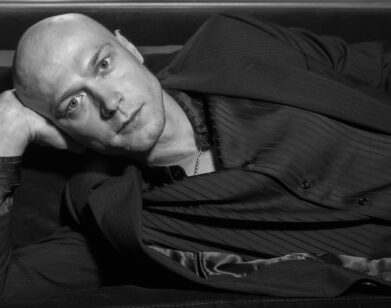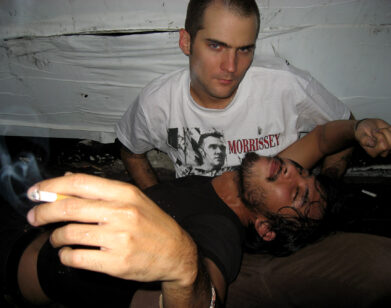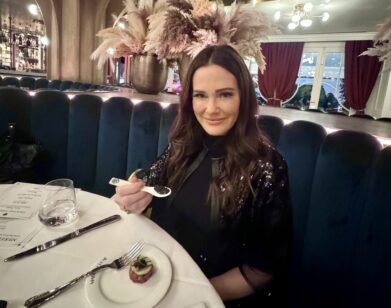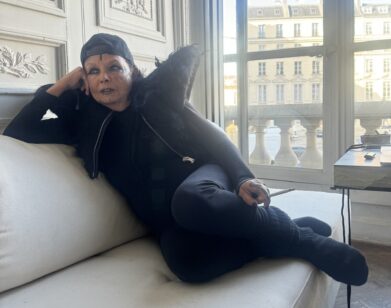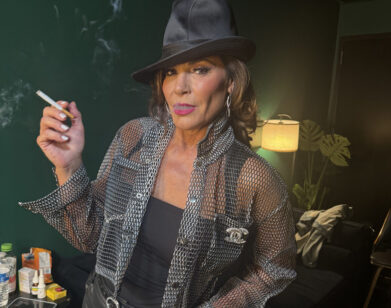Stephanie Danler’s Sweet Dreams
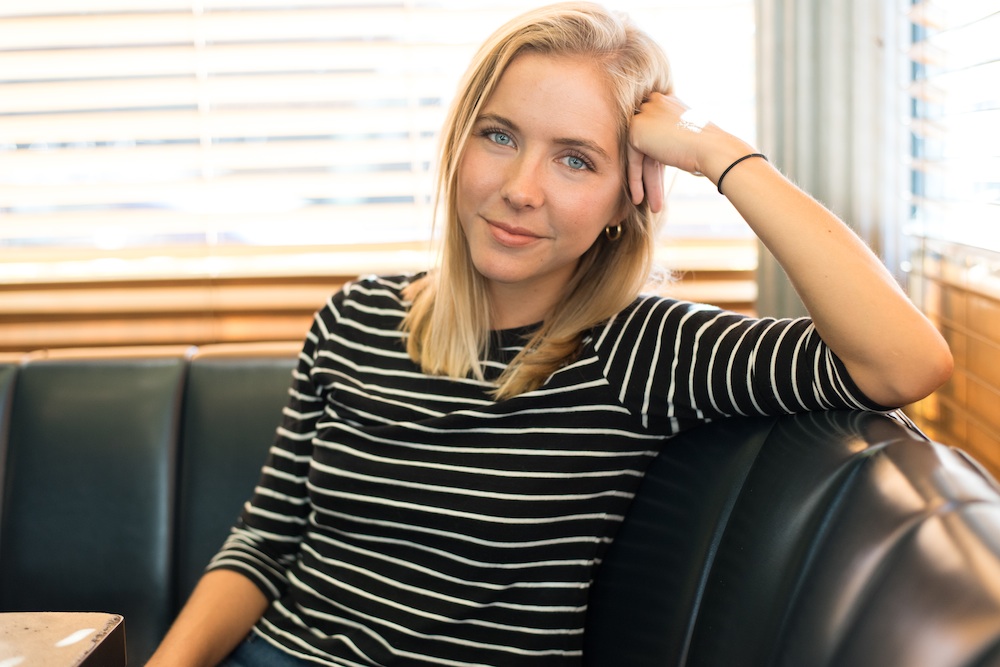
ABOVE: STEPHANIE DANLER. PHOTO COURTESY OF NICK VORDERMAN
Stephanie Danler’s propulsive debut novel, Sweetbitter (Knopf), reads like a stumble backstage at mid-’70s Rolling Stones concert. There’s commitment free sex, copious drugs, and millionaires with trophy wives. The fact that the novel is set in a downtown New York restaurant will have you peeking back into the kitchen next time you go out to eat.
Even before its publication today, much has been made of Sweetbitter. There was Danler’s advance, in the high six figures, and her personal history, some of which she recounted in a Vogue-published essay about her father’s addiction issues. The way Danler met her eventual publisher, by approaching him in the restaurant she was working at the time, was the subject of a New York Times story two years ago.
Set in New York, Sweetbitter follows Tess, who arrives in the city in 2006 at the age of 22, securing an apartment in Williamsburg and a job at a high end restaurant in Union Square. It’s a foodie’s paradise but amid the truffles and vintage wine, Tess finds herself swallowed into a black hole of cocaine, alcohol, and a bizarre love triangle. Danler, 32, who is originally from L.A. and graduated from the New School’s MFA program, is quick to point out that the only similarities between her and her protagonist are the fact that they both worked in a restaurant.
JEFF VASISHTA: You did the job an agent normally does by presenting your editor with a manuscript at your restaurant. Had you done a lot of research about literary world at that point?
STEPHANIE DANLER: Ha! I wish I could take credit like that. When I talked to [my future editor] Peter Gethers about my book, [my agent] Mel [Flashman] and I were two days away from sending the manuscript out. We already had our list set, and to be totally honest, we were looking at Doubleday within that Random House family. Peter and I had a discussion while I was waiting on him and he was generous enough to say he’d look at it—he’d been a regular at the restaurant and I really liked his taste in wine. Mel and I met with 11 publishing houses, and Knopf was our ninth meeting in a crazy, crazy week. When I walked into the meeting and saw Peter and met the rest of that incredible team, it was an electric feeling. I was desperate to publish with them. I mean, who wouldn’t be?
VASISHTA: A lot has been made of your high advance. How did it happen? Were the initial offers shocking?
DANLER: I am still in shock. Mel and I had never discussed money—not even once—but I knew that it was rare to have so many meetings. We had two pre-emptive offers before Knopf, but I still had no concept of money. You are told your entire writing life that you will never be paid for your work. When we closed the deal with Knopf, I was standing on the corner of Bleecker and Grove Street in the West Village, about to go into a shift at Buvette. I was late, on the phone with Mel, and she yelled, “It’s done!” And I said, “Great, gotta go.” I walked into the restaurant in a total daze. My manager looked at me and said, “You’re late. You’re never late.” I just nodded, changed my clothes and it was back to, “Can I get you another Manhattan?’ or, “Yes, I will bring you more bread.” I think I blacked out. Of course, book deals are paid out over years and years. The deal didn’t change my life so drastically except that I did get to stop waiting tables. And I got to write, which is the ultimate privilege.
VASISHTA: Some people might read your novel and think, plenty of high quality free food, commitment free sex, and lots of characters to write about. Perfect job for a twentysomething struggling writer. What am I missing?
DANLER: I wish I had been a single writer in my 20s in the restaurant industry. Instead, I was married, managing multiple restaurants, in wine school, and trying to open new businesses. My own life looked nothing like Tess’s. But I did envy the girls that I hired—they had so much freedom. And I wish I had been taking notes all those years on the absurd situations I found myself in. But the truth is that while I was always a writer, my life was restaurants. I wasn’t consciously documenting my experiences until I was in graduate school and trying to recall it all. By then I was 30, divorced, saddled with student loan debt and working two jobs, so it wasn’t as carefree as it might have been.
VASISHTA: You’ve documented your father’s addiction problems. Most writers are a little afraid of shocking family members with their work but clearly that’s not an issue with you.
DANLER: No one in my family is shocked about my father. We all lived through it. Since it was published, there have been nothing but kind letters from the people that knew him or me during that time. That essay was much more about me and my struggle to create boundaries over the years. I’ve always been able to view my father with compassion, even when I haven’t been able to have him in my life.
VASISHTA: Were you afraid that old co-workers would think that you were writing about them or that the restaurants where you used to work would be worried you’d let all of the secrets out of the bag?
DANLER: I was worried that they’d be disappointed that it wasn’t more autobiographical, or that they would look through the book to find themselves and come up empty. I had 16 years in the restaurant industry. I started hostessing when I was 15 years old at Walt’s Wharf in Seal Beach, California, and I’ve been in restaurants ever since. I had plenty of experience to draw from. But the characters, the plot, it’s all made up. Even the restaurant in the book—though modeled physically on Union Square Café—is a composite of all the places I’ve worked. That’s the thrilling liberty of fiction. I can’t even think of a secret I let out! Is it a secret that young servers in New York City do cocaine? That might be one that I let escape.
VASISHTA: There’s so much foodie information in here like truffles smelling like testosterone to female pigs. I’m wondering how much stuff you had to leave out?
DANLER: I had to cut so much food writing—so many details and facts picked up from my travels or from my antique cookbook collection. When I was editing, it came down to only choosing the food scenes and moments that were absolutely essential to Tess’s development. I remember a great scene where she and [the sous chef] Scott were talking about Catalan anchovies and him going to eat at El Bulli and what was happening in Spain in 2006. I loved that scene. There were pages and pages of drunken bar banter. It was, unfortunately, not essential. I learned quickly that being able to write about food is not the same thing as being able to write a novel.
VASISHTA: In the novel, Tess says of New York, “It was ludicrous to live here and yet I knew I could never leave.” You now live back in L.A. What made you decide to move?
DANLER: I like to think of it as a break, maybe because my sister is in New York and I’m with her nearly once a month. But the move to L.A. is important for so many reasons—my life in New York was beautiful, but punishing. I worked 70+ hours a week for years. That’s the nature of the business, and the nature of the city. I also like being away from the center of the publishing industry. There’s so much noise in New York, so many people to meet, parties to go to, so many politics. That stuff isn’t my job. My job is to write, and I wanted quiet. I’ve only been there a few months, but L.A. has been very quiet and kind to me.
VASISHTA: Jake and Simone’s relationship is nebulous. Are they more like a brother and sister or boyfriend and girlfriend? What was the inspiration behind them?
DANLER: I was rereading a lot of Henry James the summer between my two-year program, and I was thinking of Osmond and Serena Merle in Portrait of a Lady. That claustrophobic, toxic attachment that goes deep under the surface, and one that you can never see clearly. Jake and Simone took off from there—I’ve written so much backstory, so many timelines about what led them to that moment at the restaurant. Telling the story in the first person is limiting in a way; the novel is so close to Tess’s voice and to what Tess can catch with her eyes, and a huge part of being that age is not being able to fully see what’s right in front of you.
SWEETBITTER IS OUT TODAY, MAY 24.

